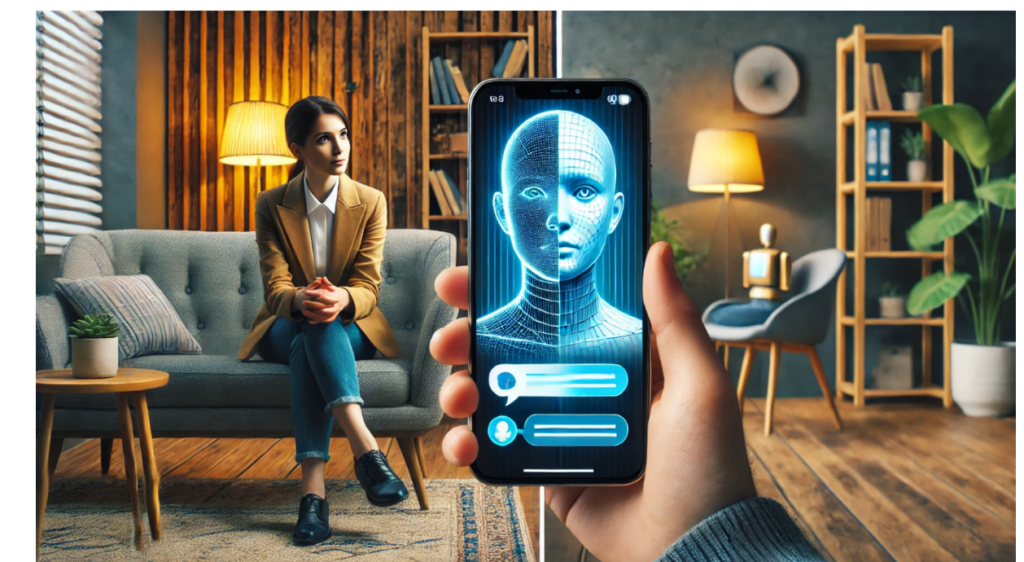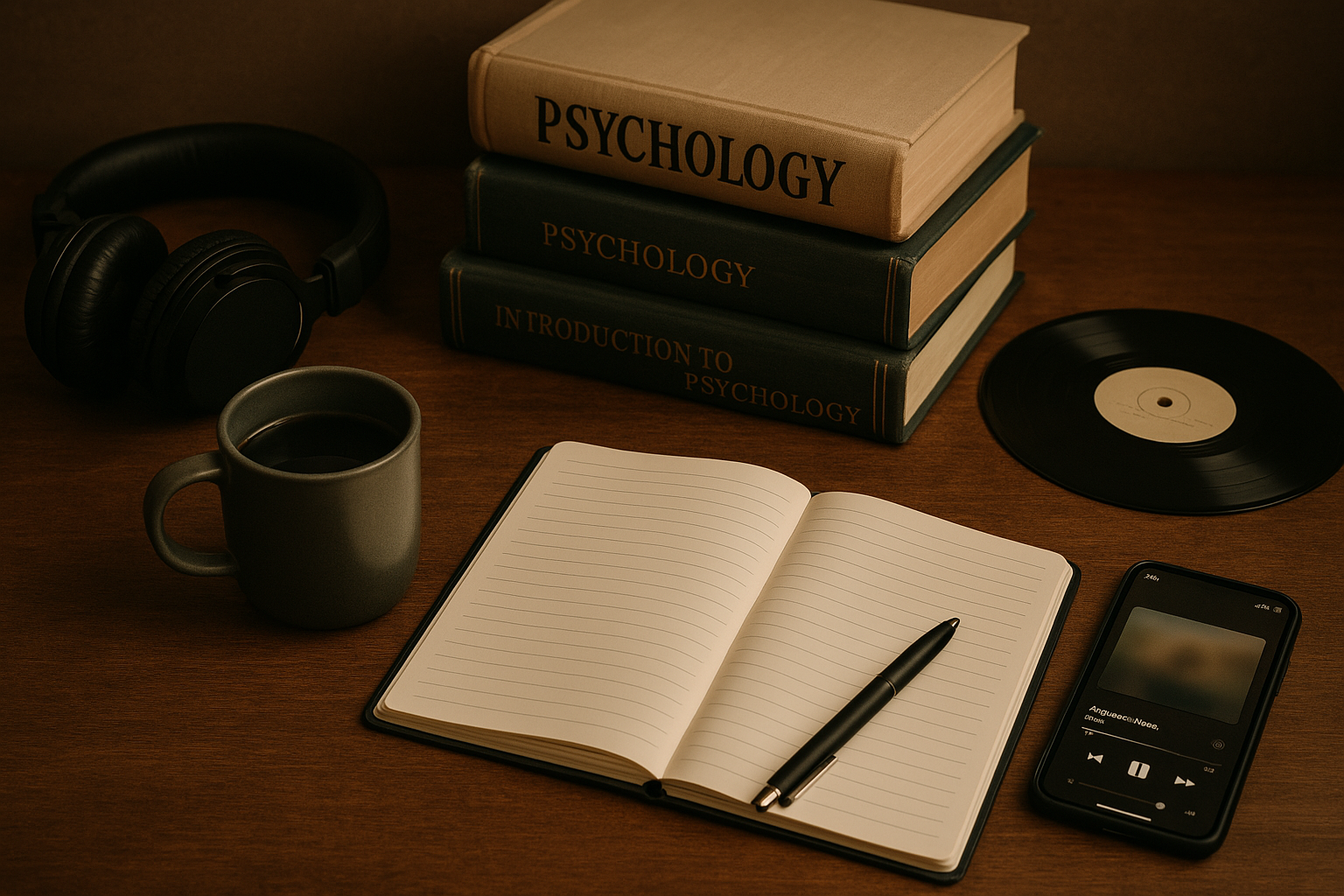Can AI Replace Therapists? Psychology Reveals the Truth
March 26, 2025 | by Mindseek

Ever Poured Your Heart Out to a Chatbot? Same.
Let’s be real—life can be a mess sometimes. You oversleep, spill coffee on your laptop, forget an important deadline, and suddenly, your brain decides this is a defining moment of failure. And if you don’t have a therapist on speed dial, where do you go?
These days, you might end up talking to AI therapy apps like Woebot or DeepSeek AI instead of an actual human. No awkward waiting rooms, no scheduling hassles—just a 24/7 virtual therapist ready to hit you with a “How does that make you feel?” at 2 AM.
But does AI in mental health actually work? Can a chatbot help with anxiety, depression, or that all-consuming Sunday night dread? Or are we just fooling ourselves by venting to generative AI instead of a human being?
Let’s break it down.

AI in Mental Health: A Digital Shoulder to Cry On?
Therapy has always been about human connection—feeling seen, heard, and understood. So, the idea of pouring your heart out to an algorithm sounds… well, a bit odd. But here’s the thing: AI in psychology is making big moves.
Apps like DeepSeek AI, Wysa, and Woebot are stepping into the world of therapy, offering AI-driven mental health interventions that claim to:
- ✔ Listen to your worries (without judgment)
- ✔ Offer solutions based on Cognitive Behavioral Therapy (CBT)
- ✔ Be available anytime, anywhere—no appointments needed
- ✔ Costs way less than a human therapist (because AI doesn’t charge by the hour)
Sounds great, right? But before we start handing out therapist licenses to chatbots, let’s dive into what AI therapy gets right—and where it crashes harder than your laptop on update day.
The Psychology of AI Therapy: Helpful or Hype?
Cognitive Behavioral Therapy Using AI: A Game-Changer?
Ever feel like your brain is working against you? One tiny mistake, and suddenly, you’re spiraling.
“I’m the worst. I’ll never succeed. My cat probably hates me.”
That’s where Cognitive Behavioral Therapy (CBT) comes in. It’s like a mental detox—it teaches you to catch those irrational thoughts, break them down, and reframe them logically. It’s one of the most effective forms of therapy, and AI therapists are trained to deliver it.

Imagine this:
- Instead of texting a friend “I’m a disaster”, you type it into an AI therapy app. It responds, “Are you really a disaster, or did you just have one bad morning?”
- It doesn’t judge, it doesn’t sigh deeply before giving advice—it just guides you step-by-step to reframe your thoughts.
And weirdly enough? It works. Apps like Woebot use machine learning in psychotherapy to recognize patterns in how you talk about your emotions and guide you toward healthier thought processes. Studies show AI-powered CBT can actually reduce anxiety and depression, especially for people who might avoid human therapy.
But here’s the catch: CBT isn’t just about answering pre-programmed questions. A human therapist reads between the lines—they notice when you pause before answering, when your tone changes, or when your eyes say what your words don’t. AI? Not so much.
The Placebo Effect & AI Therapy Effectiveness
Ever taken a sugar pill and felt better just because you believed it was medicine? That’s the placebo effect, and guess what—it works in therapy too.
- 📌 If you believe an AI chatbot is helping you, you might actually feel better. Your brain wants to be helped, so sometimes, it convinces itself that AI therapy is working.
📌 But real therapy isn’t just about feeling better in the moment. It’s about long-term growth, deeper self-awareness, and emotional breakthroughs—things an algorithm isn’t designed to handle.
So yes, AI therapy can feel effective, but whether it is effective in the long run? That’s another story.
Can AI Really Understand Human Emotions?
AI in mental health is making huge strides, but let’s get one thing straight—it doesn’t feel anything. It doesn’t get chills from a haunting line in Wuthering Heights. It doesn’t cry when a beloved character dies in Les Misérables. It doesn’t feel that strange mix of nostalgia and longing when an old song takes you back to a moment you thought you’d forgotten.
What it does have is pre-programmed empathy. It can analyze your words, pick up patterns, and craft responses that sound supportive. But there’s a difference between sounding like it cares and actually understanding what you’re going through.
A human therapist? They catch the subtle hesitation in your voice, the flicker of emotion in your eyes. They hear the things you don’t say. They know when to push and when to just sit in silence with you.
An AI therapist, on the other hand, is like a well-rehearsed actor—it can say all the right things, but does it truly feel them? Not even close.

So, here’s the real question—does therapy need actual human connection to work, or can an algorithm really help us heal?
Where AI in Therapy Shines (and Where It Flops Hard)
✔AI in Mental Health Works Well For:
- Mild mental health issues – If you need daily check-ins, stress management, or habit tracking, AI can help.
- Immediate emotional support – AI chatbots can provide a quick venting session at 2 AM when no one else is awake.
- Stigma-free therapy access – Many people feel more comfortable opening up to an AI than a human.
- Crisis detection – Some AI-driven virtual mental health assistants can recognize distress signals and direct users to emergency help.
❌ Where AI Mental Health Falls Short:
- Deep trauma work – AI is not built to navigate complex emotional trauma.
- Human intuition – A chatbot won’t notice when you say “I’m fine” but actually mean “I’m falling apart.”
- Ethical issues – Who owns your chat data? Can AI misinterpret distress signals? Are these AI counseling services even regulated?
The Future: AI & Human Therapists Working Together?
So, will AI replace therapists entirely? Probably not.
Instead of replacing human therapists, AI could become a powerful tool to:
- Screen patients before therapy, directing them to the right level of care.
- Provide support between sessions, helping with daily mental health check-ins.
- Assist therapists by tracking progress and analyzing patient trends.
But when it comes to real emotional breakthroughs, deep healing, and human connection, AI is still just a really smart chatbot—not a human.

Final Thoughts: AI Therapy—A Friend, Not a Fixer
At the end of the day, we don’t just want advice—we want to feel understood. When life gets messy, when our thoughts spiral at 2 AM, or when we’re carrying the kind of heaviness words can’t quite explain, what helps isn’t just a well-timed response. It’s knowing that someone truly gets it.
And that’s where AI in psychology draws its line. It can track patterns, suggest coping strategies, and be there 24/7—but can it truly get you? Can it hear the weight in your silence or the crack in your “I’m fine”? Maybe AI therapy is the future. But no matter how advanced technology gets, some things—like feeling truly seen and understood—will always need a human touch.
What do you think? Would you open up to an AI therapist, or does the idea feel a little… empty? Let’s talk. 👇
RELATED POSTS
View all




Leave a Reply